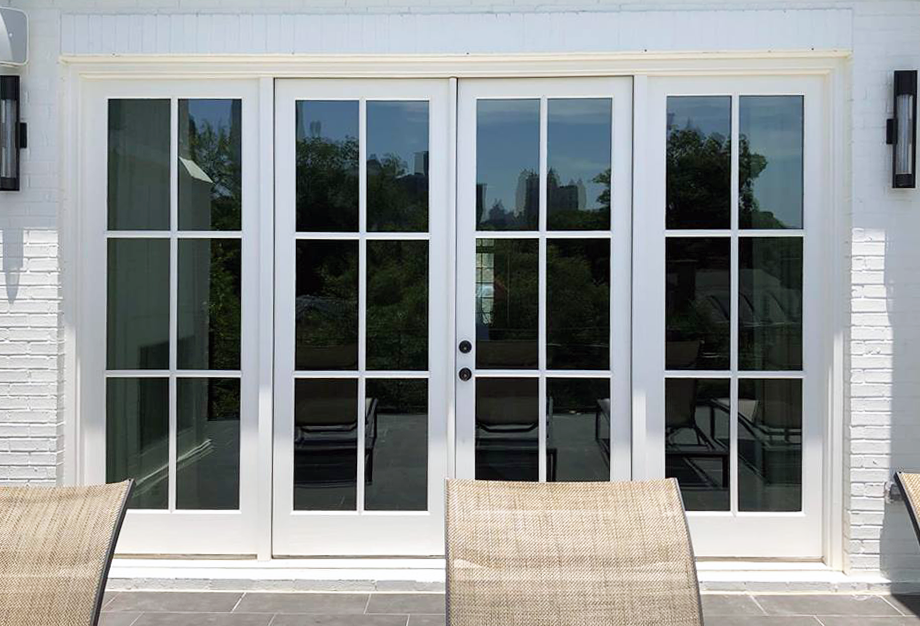Residential Window Tint: Shield Your Furniture from UV Damages
Residential Window Tint: Shield Your Furniture from UV Damages
Blog Article
Exactly How Residential Window Tinting Enhances Your Home's Energy Performance
Residential home window tinting provides an engaging service for homeowners looking for to enhance power effectiveness within their living spaces. By applying specialized films to home windows, it successfully lowers warm transfer, thereby supporting indoor temperature levels and lessening the need for extreme heating or air conditioning. This not just stops energy usage however additionally supplies a more comfy setting by reducing glare. However, understanding the nuances of exactly how tinting jobs and picking the proper type for your home can be crucial. Curiously, what elements should one take into consideration prior to making this financial investment?
Comprehending Home Window Tinting
Recognizing window tinting is vital for homeowners looking for to enhance both comfort and power efficiency in their living spaces. Residential Window Tint. Window tinting entails the application of a thin film to the inside or exterior surface area of glass windows. This movie can considerably modulate the amount of sunlight and heat that goes into a home, thus influencing indoor environment conditions
There are different types of home window tinting films readily available, each with distinctive residential properties. The efficiency of home window tinting is commonly determined by its Visible Light Transmission (VLT) percentage, which suggests how much light can pass via the film.
Advantages of Energy Performance
Window tinting not just improves looks but additionally plays a significant duty in improving power efficiency within household spaces. By minimizing heat transfer with windows, tinted movies create a much more stable interior climate, which can bring about considerable decreases in energy usage for cooling and heating. This power efficiency equates right into lower utility costs, providing house owners with substantial lasting savings.

Furthermore, home window tinting boosts the comfort of living rooms. By lessening glare and obstructing unsafe UV rays, colored windows develop a more pleasant setting, which can cause improved health for passengers. The security against UV rays likewise helps maintain furniture and floor covering from fading, adding to the longevity of household products.
How Tinting Functions
Tinting films run with a combination of innovative products and technologies made to manage the amount of solar power going into a home. Largely composed of polyester, these movies commonly incorporate metal or ceramic bits that mirror and take in warmth. This dual capacity allows them to significantly lower the penetration of ultraviolet (UV) rays and infrared radiation while permitting noticeable light to pass through.
The Get the facts efficiency of home window tinting is measured by its solar warm gain coefficient (SHGC), which shows just how much solar power is transmitted through the home window. Reduced SHGC values are more effective as they Get More Info denote higher heat rejection. Additionally, window tints can feature a selection of tones, enabling homeowners to customize their aesthetic choices while boosting power efficiency.
Moreover, these movies work as an obstacle, avoiding warm loss throughout chillier months by mirroring indoor heat back right into the living area. This thermal insulation impact matches the air conditioning advantages obtained throughout warmer months, adding to a well balanced interior environment year-round. By managing solar power effectively, domestic window tinting not only Source enhances comfort but also plays an important role in decreasing energy consumption and lowering utility bills.
Picking the Right Color

There are different kinds of window movies readily available, including dyed, metalized, and ceramic. Ceramic films supply superb heat control without jeopardizing exposure and are extremely sturdy, making them a preferred choice.
Visible light transmission (VLT) is another critical factor, as it shows the quantity of natural light that can travel through the tinted glass. Property owners ought to choose a tint with a VLT that matches their illumination preferences while still offering appropriate glow decrease.
Furthermore, analyzing the solar warmth gain coefficient (SHGC) can aid determine just how well a color can obstruct warmth from sunshine. A reduced SHGC indicates better warmth control, inevitably boosting power performance.
Installment and Upkeep Tips
Proper installment and maintenance are essential elements in taking full advantage of the benefits of household home window tinting. Professionals also make use of specialized devices and methods, which can enhance the sturdiness and performance of the tint.
Complying with installation, maintenance is crucial to prolong the life of the home window movie. It is recommended to wait at least 30 days prior to cleaning the tinted windows to enable the glue to treat completely.
In addition, normal assessments are valuable. Inspect for any type of peeling or bubbling, which can suggest inappropriate setup or wear in time - Residential Window Tint. Addressing these problems immediately can prevent more damages and preserve power effectiveness. By sticking to these installment and maintenance ideas, property owners can guarantee their window tinting continues to provide significant power financial savings and comfort for many years ahead.
Conclusion
In verdict, domestic home window tinting serves as a reliable solution for improving power effectiveness within homes. By reducing warm transfer and obstructing damaging UV rays, home window films contribute to decrease energy usage and boosted indoor comfort.
Home window tinting involves the application of a slim movie to the interior or outside surface of glass windows. By lowering heat transfer through windows, colored movies create a much more secure indoor climate, which can lead to considerable decreases in power consumption for heating and cooling.The efficiency of home window tinting is gauged by its solar warmth gain coefficient (SHGC), which indicates exactly how much solar energy is transferred through the window. By handling solar power properly, residential window tinting not only enhances comfort however likewise plays a crucial duty in lowering power intake and decreasing energy costs.
By reducing heat transfer and blocking hazardous UV rays, window films contribute to lower energy consumption and improved indoor convenience.
Report this page